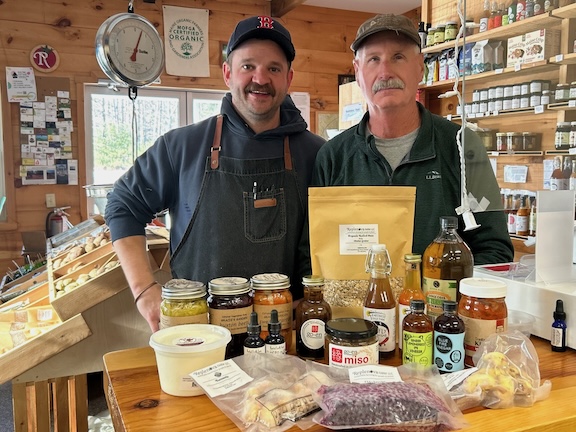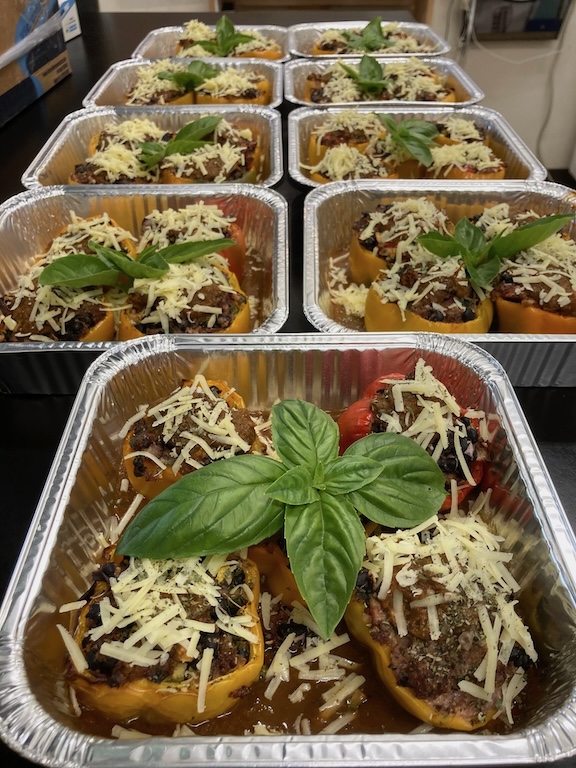By Sonja Heyck-Merlin
Possibilities greet customers as they step into Replenova Farm’s store and take-out counter on busy Route 136 in Durham, Maine. And they change with the seasons. In the summer, there are cucumbers to pickle, jars of fresh local strawberry jam ready to be slathered onto a slice of freshly baked bread, and peppers to roast. In the winter, there are premade dinners of fried kamut (an ancient grain) topped with chicken teriyaki and bok choy, bags of mustard greens harvested from the high tunnels a few yards away, and mixed heirloom dry beans ready to be transformed into soup.
Farm owner Gary Goodrich smooshed together two Latin verbs — “renovare” (to renew) and “repleo” (to replenish) — in concocting the name Replenova. Twenty-five years prior, Goodrich, who has a bachelor’s degree in biochemistry and a master’s in clinical chemistry, settled on a simpler name for another business: Bioprocessing, Inc.
Bioprocessing, Inc., based in Portland, Maine, produced and marketed raw materials for testing and managing cancer, and when the chance came along for Goodrich to sell the successful business in 2012, he took the opportunity. He continued to work part-time for the company, but Goodrich grew weary of the required travel time. Although his friends and colleagues questioned his next career move, he erected three high tunnels on leased land in Cumberland, developed some wholesale accounts, and started selling tomatoes and a few other crops. He opened a farm store in 2020, just as the COVID-19 pandemic struck.
“I’ve always had an interest in feeding people and good health. So, this was an opportunity to try to take a hand at farming as sort of a second act,” says Goodrich, who is in his early 70s.
Having been the marketing and finance arm of Bioprocessing, Inc., Goodrich quickly recognized that he would have to scale up the business in order for it not to be an “ongoing concern financially,” he says. He purchased the Durham property, essentially a 17-acre blank slate, and constructed a 40-by-60-foot barn with an attached farm store.

The barn has a 23-kilowatt roof-mounted solar array, supplying 90% of the farm’s electricity needs, partially funded by a Rural Energy for America Program (REAP) grant. In 2024, Goodrich cohosted an open house, along with his installer, Maine Solar Solutions, to share his experience and promote the solar industry in Maine. Goodrich thinks solar is especially important for energy-intensive farms. Also included in the barn construction were two commercial kitchens, a wash/pack area for produce, walk-in coolers, and enough space for equipment storage. There are no residences on the site.
The head vegetable grower for the last five seasons, Eric Day, helped move the farm from Cumberland to its permanent location in Durham. A year-round employee, Day recognizes that the growing practices at Replenova — cultivating about 1 ½ acres of diversified vegetables in 30-inch beds — are standard to many of Maine’s organic vegetables farms. What makes the farm unique, in his mind, are the efficiencies gained from having new infrastructure, as well as their made-from-scratch foods. “There are very few farm-to-tables out there where there’s an actual farm,” Day says.
In addition to premade dinners, full-time chef Ben Fauske cooks made-to-order breakfasts and lunches Tuesday through Saturday. Due to Durham’s zoning, they can’t seat people as in a restaurant. Instead, customers order at the counter. During the warm months, they have the option to eat at picnic tables outside.
The meals draw on Replenova’s produce and the majority of purchased ingredients come from growers, bakers, and makers within Maine. Fauske’s summer smoked ham and barbeque sandwich, for example, includes smoked ham shank from Old Crow Ranch; Sonnental Farm Gouda cheese; Replenova spinach, garlic, and fresh jalapenos; and house-made jalapeno and peach barbecue sauce. The bun, topped with everything seasoning, is also made in-house.
For Fauske — a former corporate chef whose resume includes cooking for celebrities such as Michael Jordan, Rudy Giuliani, and Alice Cooper — the little farm kitchen is an opportunity to craft tasty, eye-catching, nutritious food, but he also hopes diners glean some culinary inspiration from his meals. The farm serves as inspiration for Fauske; the culinary industry had left him burned out to the point where he thought he wouldn’t step into a restaurant again.

“It is such a different dynamic as far as working in a kitchen goes where normally if I wanted to put something on a menu, I’d have to run it through four or five people before that would be ok. And I could only use one vendor, and it had to be Cisco or U.S. Foods. Whereas here’s it’s like, ‘Oh, what are we harvesting today? Oh cool, you’ve got vine-ripe heirloom tomatoes, let’s put this on a sandwich,’” Fauske says.
Sometimes Fauske misses a large gleaming kitchen and a crew, just like sometimes Day wishes he was growing on silty river bottom land rather than Replenova’s poorly drained, heavy clay soils. Slowly, they’ve been building soil fertility and focusing on high-value, productive crops such greens, alliums, fennel, cucurbits, peppers, tomatoes, root crops, sugar snap peas, and herbs.
They’ve realized that some crops, like brassicas and potatoes, just don’t do well in their soil. Each growing season, they keep about ¼ acre in cover crops, typically a spring planting of buckwheat followed by an oat and pea mix. To terminate the cover crops, Day has used tarping (covering large sections of the cover crop with silage tarps) as well as bush hogging followed by rototilling. He’s still fine-tuning the timing and stage of growth for terminating cover crops. Day and Goodrich hope that, as their soil fertility improves, they can experiment with less disruptive tillage equipment rather than always relying on their PTO-powered rototiller, which they currently use to break up the heavy clay soil.
Another struggle has been deer pressure in both their field and cover crops. They recently fortified the electric fencing around their field perimeter, and 2024 was the first season where the deer didn’t cause significant crop damage. Replenova’s cultivated ground is divided into roughly nine sections, each measuring 30-by-100 feet. This ground is now surrounded by a double electric fence. First, the deer face a 4-foot-high single strand of steel wire, then a 4-foot gap, before facing a 12-foot fence with four strands of wire.
Fortunately, the deer steer clear of the farm’s six Ledgewood high tunnels. Four tunnels are rotated through early greens, turnips, and radishes, followed by sugar snaps and tomatoes, a late planting of cucumbers, and then winter greens. The fall cucumbers are a wholesale niche they fill in Southern Maine’s organic vegetable market, which Goodrich says feels a bit saturated.
Two other tunnels are reserved for a rotation of ginger and turmeric, two high-value crops that make regular appearances in the kitchen and in some value-added products, including dried teas. Manure purchased from dairy farms and composted onsite helps to boost the fertility in the high tunnels. Because multiple crops are grown each season in the tunnels, the demand on the soil is high. The plan for the future is to pull one tunnel out of production each winter and plant it to a cover crop.
With the winter greens, harvesting, washing, and selling produce is a year-round effort. Currently, about half of Replenova’s produce is wholesaled to natural food stores and restaurants (Whole Foods is their largest wholesale purchaser). The other half is either sold in their farm store or used in their prepared foods. Replenova is certified organic by MOFGA and is also audited by the United States Department of Agriculture’s Good Agricultural Practices (GAP), which verifies that fruits and vegetables are produced, packed, handled, and stored to minimize risks of microbial food safety hazards.
In 2024, Goodrich donated about 3,000 pounds of produce to local food pantries. He also has a small yearly contract with Mainers Feeding Mainers, a program run by the Good Shepherd Food Bank of Maine, that purchases produce from Maine farms to be distributed to food banks within the state.
In Replenova’s farm store, the offerings of farm-grown produce and prepared food are rounded out with products from a diverse selection of local producers. Goodrich proudly displays a map of Maine with a pin representing each vendor. He says, “I’ve got about 75 local vendors within a 30-mile radius. So, everything that we’re reselling in the market is 100% local. And, I like to be transparent about where everything is coming from.”
Chef Fauske draws inspiration from this vast array of local products. Goodrich refers to Fauske’s creations as “Ben-spirations” in his frequent social media posts. A recent Friday night dinner included a risotto in which Fauske swapped out the conventional starch, Arborio rice, for spelt farro, a Maine-grown grain sourced from Skowhegan-based Maine Grains. Fauske says, “I was just looking at the farro one day and I’m like, ‘Why can’t I do that?’ And it’s a healthier grain. So that kind of experimenting at the farm is something that kind of threw me for a curve at first, but now I embrace it.” The creamy grain dish was slow-cooked with house-made chicken stock and incorporated roasted Honeynut squash towards the end of the cooking process.
Goodrich, primarily a vegetarian and a strong believer in food as medicine, or “culinary medicine” as he refers to it, would like to further the diversity of the farm’s offerings by adding live cooking events. Fauske would take the lead on the hands-on part of the event. “I love teaching. Any chance I can get, I will teach,” Fauske says. Meanwhile, Goodrich plans to deliver some information on the nutritional aspects of the meal. At the end, they envision participants eating together or bringing home the prepared food with some recipes in hand.
This goal — to get people eating more vegetables, to become appreciators of Maine’s robust selection of agricultural products, and to share the farm — is the same reason Goodrich hauls cherry tomatoes and snacking peppers to Regional School Unit 5, which services Freeport, Durham, and Pownal, for sampling during lunch time. “If they ate it, we gave them a sticker. So, I think what has to happen is kids at that age have to have vegetables. You’ve got to get them to eat vegetables at that age,” says Goodrich.
It’s also the reason why Day regularly leads a high school life skills class centered on farm activities. Then there’s a group of kids invited to the farm each fall to help plant garlic. And Replenova hosts community fundraising events with a food truck and live entertainment for organizations such as the Durham Warriors Project, which covers the costs for disabled veterans, active-duty military, and their families to stay in some nearby yurts.
Year-round, the Replenova triad — Goodrich, Day, and Fauske — share what they have: recipes on a rack in the farm store, an egg sandwich on a homemade English muffin, a diversity of nutrient-dense produce in a rainbow of colors, a six-pack of tomato plants. And what they don’t create themselves, they seek from Maine’s vast network of local producers and makers. Catch one of them and they’d be happy to chat about solar power, ginger production in Maine, or the best way to preserve tomatoes. There’s an abundance of possibility at Replenova Farm.
Sonja Heyck-Merlin is a regular feature writer for The MOF&G. She and her family own and operate an organic farm in Charleston, Maine.
This article originally appeared in the spring 2025 issue of The Maine Organic Farmer & Gardener.
